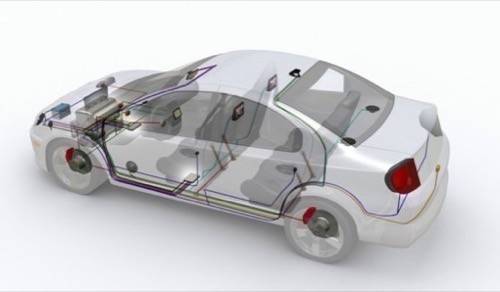
You might see your car as a means of transportation or a reflection of your lifestyle. But Verizon views the automobile as a giant mobile data device on wheels. That’s why it recently announced a $612 million cash deal that will make it the first carrier to own one of the major companies that connect cars to wireless networks.
Atlanta-based Hughes Telematics is what’s known as a Telematics Service Provider or TSP. Much the way an ISP gets your home or business connected to the Internet, a TSP provides connectivity to a car. TSPs like Hughes, Agero and OnStar not only have the technology, platform and intellectual property to sync up an automobile to the same wireless network that your cell phone uses, they also provide services such as call centers with live human beings.
OnStar Corporation – a subsidiary of General Motors – uses Verizon simply as the network carrier for services such as crash response, roadside help, turn-by-turn navigation assistance, hands-free calling and remote vehicle diagnostics. Your car becomes a big phone with a single “call” button on the rearview mirror to put you directly in touch with the call center.
“Carriers like Verizon are trying to evolve from the dumb pipe to the valuable pipe,” said Thilo Koslowski, vice president and automotive practice leader at Gartner. “Verizon could continue providing wireless networks to car companies like they do with OnStar, or they could take a larger share by creating an end-to-end solution.”
Safety First
Verizon’s purchase of Hughes inspires Jetson-like visions of connected cars offering mobile video conferencing, streaming movies, remote health monitoring and vehicle-to-vehicle communications – but those flights of fancy should be kept in check. “Just because you have a telecom that buys a company that’s automotive-oriented doesn’t open the door to take mobile services you get on your smartphone and dump them into a car,” said Frank Weith, general manager for connected services of Volkswagen Group.
“Carriers like Verizon are trying to evolve from the dumb pipe to the valuable pipe.”
-Thilo Koslowski, Gartner
Volkswagen announced Hughes as its TSP in November 2011. Hughes has counted Mercedes-Benz as one of its customers since 2007.
“Our focus is safety, first and foremost,” said Weith. He believes that car infotainment, such as offering traffic and weather or enhancing navigation, should be put in the service of safety. “It has to be real information, because you get into a car for a purpose, to get somewhere.” So, using your dashboard to make a Facebook post doesn’t make much sense.
Nonetheless, Weith realizes that drivers and passengers are usually carrying smartphones in their car. “Our challenge as automakers is to find the balance between people reaching for their smartphones to get information, and the car being able to provide you the right information in the right dosage so you don’t get distracted,” said Weith.
Tethered vs. Embedded Phones
In fact, the auto industry is divided between two primary approaches. There are companies (like Ford and Toyota) using a tethered approach in which the smartphone – already a network-connected device – is paired up via Bluetooth to the car’s computer system. Then, there are automakers (like GM, Volkswagen and Mercedes) that embed the phone into the car, and support it with TSP services.
Weith believes the embedded TSP model provides the required extra layer of security, especially in an emergency situation. It creates a central point of contact that can triage between a driver and public safety agencies. “You know you’re going to get help,” said Weith. “They’ll send an ambulance to you if you need it.” With the tethered approach, it’s more like using your cell phone to call 911. The risk is that on some days, you might forget your phone or it might not be charged.
Gartner’s Koslowski believes that all automakers will eventually need to accommodate both tethered and embedded approaches. He said that Verizon is agnostic, as long as you connect using its network services.
Upcharges
Automakers might have the burden of ensuring safety, but Verizon’s connected vehicle activities are about providing what mobile consumers want, according to Koslowski. There are services like alternative routing to avoid traffic jams, Web-based info about when a movie starts (or a film review), or downloading contacts or a music file to your car. “These capabilities in combination with Hughes’s telematics call center services can create a holistic portfolio offering” said Koslowski.
Verizon is positioning itself to offer data plans that including connectivity to multiple devices, including your smartphone, your tablet computer and what it sees as the ultimate mobile device: your car. And of course, a healthy upcharge will come along with it.

















